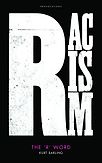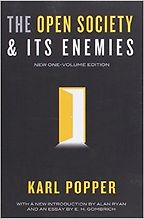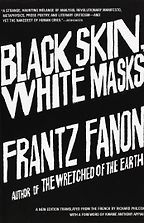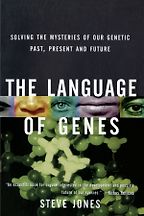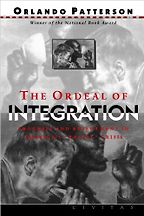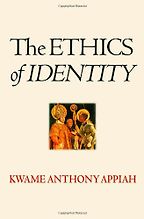Before we talk about the books you’ve chosen, what do you understand by racism?
When I was a child at nursery, before I was old enough for school, my mother had me riding on the back seat of her bicycle. This was in 1966. I was waving to Johnny, who was walking on the other side of the road with his mother, and shouting ‘Hi Johnny, hi Johnny!’ And Johnny ignored me. I don’t remember this, but my mother remembers it distinctly – I muttered under my breath ‘He doesn’t like me because of the colour of my skin’.
How could I, as a 3- or 4-year-old, understand that someone didn’t like me because of the colour of my skin? You’re not conscious of skin colour at that age unless others have made you conscious of it. There you see, right at the root, this sense of difference, and how others perceive that difference. As you go through life, you see different ways in which people use that difference in order to behave differently with you. Not everybody. But racism can start at that level as a very young child, where you begin to be set apart from your peers as a consequence of the colour of your skin (or maybe if you have red hair, or are a woman).
It’s often much easier to talk about skin colour because we have a whole history of creating classifications of people according to skin colour. That history has evolved into mythology, and that mythology has evolved into people’s behaviour to one another. That simple example is not the same as when a police officer shoots someone on the street because they have black skin. There is a spectrum, and it starts somewhere. It can end up with extremism: that is racism. Racism begat race.
Racism is about the Other. It’s about xenophobia, and fear of strangers is as old as we are. That’s why our ancestors lived at the top of a hill, so they could protect themselves against strangers who would come and take their women and their children and their children. Racism is not irrational in that sense: it is not illogical to fear the Other. Race, however, is a different matter.
Yet it’s not all about visual difference is it? Some of the most vicious racist crimes of the 20th century were committed against Jews who weren’t necessarily visually identifiable, but were only deemed Jewish by Nazi laws.
I disagree. When the National Socialists came to power in the 1930s, that coincided with a time when technology was changing. The new technology was film: the talkies. The Germans, and particularly Goebbels, were very adept at turning that into propaganda, and they made sure that Jews looked different – hooked nosed, swarthy grotesques. You can see racial stereotypes in cartoons in North America at the same time, of Irish people depicted as black, literally as black, as if they came from Africa. Even if it’s not obvious to the naked eye in every case, there were visualisations of Jews in the 1930s that played with people’s imaginations. Racism is about getting deep into people’s imagination and shaping the way they feel about the Other.
Get the weekly Five Books newsletter
If you go back to the origins of racist classifications in the 17th century and into the Enlightenment, what we find there, in the so-called laws of nature are classifications of plants, of animals, and also of human beings. What scientists saw were humans who were ‘negro’; those who were yellow, ‘Asiatics’; and white Europeans. The classification put white Europeans at the top of the hierarchy. The philosophers and scientists, most of whom had never met a black person, perpetuated myths about this hierarchy.
You’ve chosen Karl Popper’s The Open Society and Its Enemies as the first of your books about racism. Why did you choose that?
Popper is a very personal choice. I saw him lecture at the London School of Economics. I was a working class boy who was given the chance of going to university in the early eighties and attended the LSE. I had a sense of being different. I had a sense of self that my grandfather helped instill – he was old school Labour, and a communist. He thought that you should make something of yourself in the world, to take what you have and make an impact. My father was German, raised in Nazi Germany, so I have a very clear sense of the wrongs that were committed in Nazi Germany. Karl Popper was a grand figure of philosophy at the LSE then. I was already prepped to receive his wisdom as I knew he’d come from Vienna, I knew he was a refugee from Nazism, so it was a natural association. So there were very personal reasons I had for going to hear him lecture.
“How could I, as a 3- or 4-year-old, understand that someone didn’t like me because of the colour of my skin? You’re not conscious of skin colour at that age unless others have made you conscious of it.”
But when I went to the lecture, I realised I was the only person of colour in that packed lecture theatre. He talked about the enemies of the open society. It struck me that one of the enemies of the open society was exclusion. Popper doesn’t discuss colour, but he does talk about those who are ‘in’ and those who are ‘out,’ those who are part of the process, and those who are not part of the process. In the early 1980s we’d had riots in Brixton, riots in Toxteth. I’d been involved in riots in Broadwater Farm—not throwing Molotov cocktails, I should add—I just happened to be there by accident. That context meant that I really wanted to delve into the questions Popper was asking, especially the question: Who is democracy for? Popper thought it was mostly about keeping the demagogues and dictators out, not about getting the democrats in.
His book helped me to think in a different way about society. It gave me a strategy of looking for an alternative narrative, of testing the dominant position. As a journalist, it made me much more sceptical when I was presented with the dominant line: a little voice in the back of my head said, ‘Really? Let’s think of the alternative proposition here.’ In that way, Popper’s book was important for me. It gave me a kind of epiphany and helped shape a method of seeking the alternative narrative.
In terms of racism books, your second choice is Franz Fanon’s Black Skin, White Masks. Why did you choose this particular classic text?
Franz Fanon was born and raised in Martinique, part of the French empire. It’s still a ‘département d’outre-mer,’ in other words, it has the same status in France as Isère does, or Calais. It is essentially a European island. Fanon was a man of colour raised in a culture where blackness was a stain. Blackness was regarded as useless to the state, useless to commerce, useless to education. And he fought against that. He was a disciple of the great thinker Emile Césaire. Fanon was not just a thinker, he was an activist, a doer. He later moved to Algeria. He wanted to bring about change, not just think about it. Unfortunately he didn’t live long enough to see that happen.
I read this book first in French, when I was an undergraduate studying in France. I was so taken by this book, with its beautiful use of language. You didn’t read many books written by black people, and he had such a facility with language, and I thought how amazing this was. Then, when I delved into the meaning of the book, I realised that essentially he was saying that black people are re-burdened by skin colour in a white-dominated society. They learn to live as white people, but underneath they are really black people. That’s a contradiction, a kind of self-denial. But it’s a plausible proposition, particularly in the 1950s when it wasn’t straightforward for people like me to be professors in universities. It wasn’t impossible, but it was very difficult. The opportunity for people of colour to play a part in the life of Britain or France or North America wasn’t there. He was railing against that.
He gave people like me, raised in the 1970s, learning about the world in the 1980s, something to hold on to. It wasn’t so crazy to ask myself: ‘Am I living a lie?’ ‘Is this mauvaise foi [bad faith]?’ Being educated, in my case in premium institutions such as the London School of Economics, but never talking about race, never talking about difference, never being asked what I thought, as a person of colour, about the education I was receiving, never reading a book by a black person unless you went out and found it, not looking at the experiences of the diaspora. Still today, in our curriculum, there’s very little of that. Franz Fanon, being a person of colour living in an outpost of France, made me think there were some common threads here.
“What matters? What’s on the surface? Does my black skin determine who I am?”
This was the kind of alternative narrative I felt I had to pursue in order to understand my role in this society. What was I going to do with my learning? Was I going to work for a bank and make lots of money, and just hide myself away in a little private world? Or was I going to contribute to a more public wealth that tries to challenge and channel some of these ideas into public discourse? I chose the latter, and stayed an impoverished journalist for twenty-five years.
Nevertheless, looking back at Fanon, this book still resonates for me. In a way, that’s an indictment of how little the academic world has done, in Europe, to try and take on board his ideas and channel them into the curriculum and help our cosmopolitan society, that is rooted in its history, to come to terms with the modern diverse nations that we are – I’m talking about France, Britain, Germany to a lesser extent, Spain, Portugal, the United States.
Let’s move on to the scientific treatment of the things that make us who we are: genes. The second of the books about racism you’ve chosen is by Steve Jones, The Language of Genes. This is a book generally about genetics, not specifically about race, but within it there’s a lot that illuminates discussion of race.
You began the conversation by asking me about racism: racism is something that’s done to others, it’s a confection, it’s a socially-engineered notion. Race, however, is supposedly something objective, scientific. Of course, after the Second World War, after the Holocaust, people looked at this problem of race and racism, and they saw how people could see difference and use it against people. So they said racism is bad, xenophobia is bad. But they didn’t really deal with the problem of race and the poppycock that has passed for science in that area for the past two hundred years.
What attracted me to The Language of Genes was its clarity on this issue of what lies beneath the skin. What matters? What’s on the surface? Does my black skin determine who I am? When I was younger I was a great athlete and an excellent dancer. And of course people said, ‘You’re athletic, you know how to move because you have a black skin.’ That’s ridiculous. As it happens, my mother, who is Anglo-Irish, born in Hornsea in North London, is one of the best movers you could come across. That’s probably where those genes came from, not my visible skin colour. This sort of thinking always invites the question: What’s really going on? Jones got to the heart of this.
In 2000 I made a film called The Faster Race for the BBC, around the time of the Sydney Olympics. I asked the old question, ‘Why do black men run faster?’ Well, ‘Do they run faster?’ is obviously the first question. The prejudice is that black men run faster, and the evidence is that in the Olympic finals all the way back to Jesse Owens, black men seemed to take first, second, and third in nearly every event. The thrust of the film was to delve into the science. Steve Jones was a very passionate advocate in that film for the view that science shows that race, as a scientific concept, offers us no clarity at all on why we are different, why we function differently. That’s race in the broadest sense: black, white, Asian. It doesn’t help us. It isn’t scientifically useful.
“Race as a scientific concept offers us no clarity at all on why we are different.”
This helps us recognise that the original racial ‘science’ was nonsensical. Let’s not blame those scientists, because they didn’t have the tools available now. Now we can understand better that what goes on underneath the skin really matters. In The Faster Race we realised that we were asking the wrong question: blackness is not the issue here at all. Population groups is the issue. Kenyans run fast for long distances because they have a capacity to absorb oxygen and use it efficiently because they’ve been raised at high altitude. That is the answer for them. It’s not the colour of their skin. West Africans and Caribbeans have fast twitch fibres, and therefore they can sprint faster, as a population group. But it’s not the colour of their skin, it’s what going on underneath that matters. So for me, Steve Jones’s book was a text of liberation in a strange sort of way: imaginative liberation, not political liberation.
What Jones offers is that sense that we can liberate ourselves, because we can imagine things in a different way. That doesn’t mean that racism suddenly disappears. Our heads are traumatised with this notion of race. Steve Jones provides us with new memory to lay over the trauma that will help us to move on eventually. He’s applied modern science to an old problem.
We’re now at book number four of your list of books about racism. This is the Ordeal of Integration by Orlando Patterson.
All my choices have a personal aspect. I didn’t know about Patterson until I was appointed as a lecturer at the LSE in 1987. I was, I was told, the first black British lecturer ever to be appointed to the LSE. But there had been some black lecturers before from the Caribbean. Orlando Patterson was one of them. He’d ended up going to the US, to Harvard, among other places. I was interested in these people of colour who had been at the LSE before me.
Patterson was a social conservative – I wouldn’t describe myself that way. He looked at the idea of race in America through a different prism: he wasn’t trapped by the mythology, he wasn’t trapped by history. He was quite bold in his analysis, so much so that he ended up being called an Uncle Tom, and a sell out. I wanted to look at this, why he was called these things. If you dig down into his method, all he’s doing is providing empirical data to say that the debate should shift because, on the ground, things are shifting. That gave me the courage to look at things empirically and see that it was possible to share your analysis of the facts—which might get you into trouble with some people—but nevertheless wasn’t just repeating old claims.
“The remedy isn’t just to focus on the black condition, it needs to focus on the human condition.”
When you look through the literature on race and racism, the overwhelming majority of texts have been written by people of a Marxist persuasion. How useful is that if it’s all coming from that direction? We live in a pluralist society, so that’s not a good thing. We need people approaching this from different perspectives, looking at the problems our society faces, and giving their analysis of that.
What is the key theme of this book?
Patterson’s book looks at America’s racial crisis. It investigates the political emancipation of the period after the civil rights breakthroughs of the 1960s. Things moved very quickly. The paradigm that emerged was that black people had to be helped all the time through state agency.
In other words, the state had got it wrong: they’d oppressed black people, or at least people within the state had oppressed black people, and the state had done nothing to help them be free agents in a free society. Then the civil rights movement had come along and given people that agency, but the purpose of that agency was to create a collective mentality, to fight oppression. You had black rights, black activism, the call to arms of black people, which of course, in adversity, was important to drive political changes.
Five Books interviews are expensive to produce. If you're enjoying this interview, please support us by donating a small amount.
Then, as time passed, Patterson suggests, we got trapped in that new paradigm where success was failure: wherever there were failings in a black community, the solution was to bring in the state – as if whenever there were failings in a black community it simply has to do with their blackness. But inequality doesn’t just attack black people, it attacks people of all colours and all creeds: the remedy isn’t just to focus on the black condition, it needs to focus on the human condition. Patterson appreciated that. He gave the data to show this shifting territory.
The philosopher Kwame Anthony Appiah’s book The Ethics of Identity is your final choice in your reading list of books about racism. Appiah defends a kind of cosmopolitanism that both recognises that we are citizens of the world in some sense, but also celebrates difference. Why did you choose this book?
Appiah is a gay man of Anglo-Ghanian heritage living in the United States. He well understands the pressures of differences from those around him. He recognises that he has to reconcile those differences, and that we, as a community, have to recognise differences.
I think he’s right: we don’t all have to be the same, but we need to respect each other’s differences. At the same time, we need a common language so that we can explore who the enemies of the open society are, because if we don’t identify them, we are really going to struggle. These enemies are all about us and are constantly trying to undermine us and attack our differences. We have to find common ground, and a common language. Appiah offers an imaginative moral solution to that. I applaud him for having done so, and his work has helped shape the way I think.
“I’m more than the sum of my parts. That is what I told Enoch Powell when I met him in 1992.”
Appiah appeals to my sense of fairness, and appeals to my sense that difference does matter. I’m very conscious of the differences that have shaped me, but I’m more than the sum of my parts. That’s where the cosmopolitanism lies. That – by the way – is what I told Enoch Powell when I met him in 1992. I said, ‘Enoch, you were wrong. You said, in 1968, when those bovver boys in laced up boots were spitting in my face, that we had no place here. You were wrong. We have shaped a place for ourselves in Britain. If only you would embrace us, we would embrace you, and we can find a common place where we don’t need to shed blood in the River Tiber.’
How did Powell reply to that?
He was very quiet and thoughtful.
In your book, The ‘R’ Word: Racism and Modern Society, you talk about the possibility of going beyond racism, beyond ideas of race too. What do you mean by that?
We have to accept, first, that race doesn’t exist in any meaningful scientific sense. Most people have accepted that. What we’re still left with is cultural racism, that is, that people do still behave differently to other people because of the colour of their skin. In addition to that, black people themselves have become enslaved in the mythologies passed down from history. They need to unchain themselves from that slavery of language.
If I have a student of colour come into my university office, I’m not interested in his or her skin colour. I’m more interested in the quality of their mind, and their ability to apply themselves to a particular problem. If we can create a new cadre of people who get beyond the idea of race defining them, we can get beyond the mentality reproduced by cultural racism. It is a function of imagination. We have to learn to re-imagine ourselves. We have to get to a position where people are not defined by the colour of their skin, but by the content of their character and the contribution to the world they want to make.
Five Books aims to keep its book recommendations and interviews up to date. If you are the interviewee and would like to update your choice of books (or even just what you say about them) please email us at [email protected]

